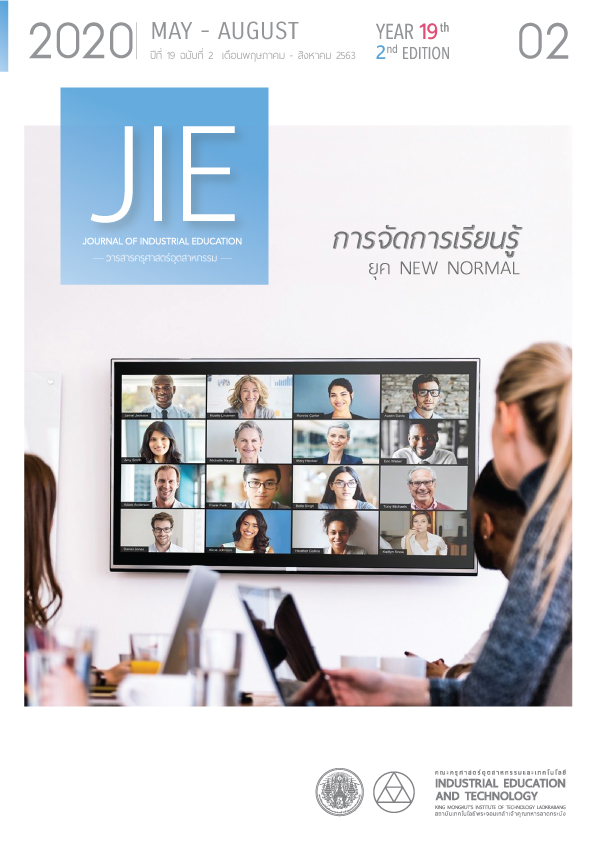USING SOCIAL MEDIA-MATERIAL FOR LEARNING IN CHILD PSYCHOLOGY IN SCHOOL
Keywords:
Online-materials, Child Psychology in School, Emotional QuotientAbstract
The study aimed to investigate the integration of social media module applied Child Psychology in School. The simple random sampling consisted of 25 students at Kasetsart University registering for Child Psychology in School (01166461) of section 1 in the academic year 2019. This research is a quasi-experimental research. The instruments of this study were 1) a questionnaire on interests of students to participate in social media-based activities 2) a plan for the activities of learning in Child Psychology in School Class for learning unit; emotional quotient 3) a satisfaction questionnaire of students participating in the activities 4) An examination for Child Psychology in School Class for learning unit; emotional quotient. All instruments were significantly assured validity by utilizing the index of item-objective congruence (IOC) ranging from 0.86 to 1.00. Statistical Analysis (Frequency distribution, percentage, mean, and standard deviation) was facilitated to illustrate and analyze data. A paired sample t-test was used to examine the difference scores.
The findings indicate that 1) in terms of the interests of students to participate in social media-based activities, a majority of students were likely to participate in group activities in order to reciprocate knowledge, to access updated information and advanced intellect via an online database, and utilize an online assessment test for self-awareness. 2) The plan for organizing learning activities was completed and covered the use of social media according to the interests of students, and its content validity was deliberately scrutinized by respective experts. 3) The emotional quotient scores of the students participating in the posttest activities ( = 13.26) were significantly higher than before the activity participation (
=11.91) at 0.05. A majority of participants had a positive tendency to satisfy with activity participation at the highest level in 2 aspects, respectively; they were the provided activities assisted students to individually reflect themselves and participate in activities that allowed students to develop their emotional quotient. One of the potential possibilities concerning this research study is to pilot further learning activities through an online platform to adopt presently dynamic learning styles.
References
Iamkongsi S. 2018. Classroom Management in the 21st Century. Bangkok: Triple Education
Higher Education Commission. (2019). Guidelines onImplementing the National Qualifications Framework for Higher Education on Digital Literacy for Bachelor’s Degree.Retrieved December 2, 2019, from http://edu.vru.ac.th/main/wp-content/uploads/2019/01/2561-12-27-digitalbase.pdf.
Amornwiwat S. Teacher Education and Challenging Changes. Bangkok: Watcharin P.P.
Ministry of Education. (2013) Ministry of Education Urgesthe Teachers to Adjust their New Rolesto Keep up with Technology in Order to Teach Students.Retrieved December 2, 2019, from http://www.moe.go.th
Vanichbuncha K. 2001. Statistical Analysis: Statistics for Decision Making. 5th edition. Bangkok: Thammasarn Company.
Sarawanawong J. et al. 2016. Online Social Media Usage Behaviors of Undergraduate Students, Kasetsart University. Journal of Library and Information Science Srinakharinwirot University.10(2) July- December . 2016.p17-31
Pratoom N. 2015. Guidline for Using Online Social Network in A Studio Art Program of Undergraduate Students.Master Degree of Education Thesis in Art Education, Chulalongkorn University.
Rattanathamrongpun T. et al. 2015. A Study of Behavior and Impact of Using Online Social Network Chulabhron (Ladkwang) Technical College Students. [online]. Journal of Industrial Education. 14(2) May-August 2015. p305-311. http://161.246.14.29/journal/images/stories/year14_2/vol14_02_41.pdf
White, C. M. 2012. Social media, crisis communication, and emergency management: Leveraging web 2.0 technologies. Boca Raton, FL: CRC Press.
Nitipornmongkhon P. 2015. Social Networks Usage of Working People in Bangkok. Journal of Industrial Education. Faculty of Education, Srinakharinwirot University, Volume 9 No 2 July-December 2015.p63-71
Bangthamai E. 2015. The Development of Learning and Teaching Activities Through Online Social Networking to Promote Creative Internet Using for Students in Tertiary Level. Faculty of Education, Silpakorn University. Nakhonpathom.
Satiman, A. 2007. Effects of Project-best Learning Activities via Internet on Self-Direct Learning and Achievement Higher Education Student. A Thesis of Doctoral Degree of Education (Education Technology) Graduate school Srinakarinwirot University, Bangkok.
Saiplang J. 2017. A Development of Mobile Learning on Process Modeling for System Analysis and Design. [online]. Journal of Industrial Education. 16(1)January-April 2017. p.25-33. http://161.246.14.29/journal/images/stories/year16_01_03.pdf
Damjub W. 2019. Social Media for Teaching and Learning in the 21st Century. Journal of Liberal Arts Maejo University. Vol7.No2. July - December 2019. P.143-159
Thanakijcharoensuk T. 2016. The Development of Ubiquitous Learning Model Via Online Social Media for Undergraduated Students. Journal of Education SWU. 17(1) January-June. p16-23
Downloads
Published
How to Cite
Issue
Section
License
Copyright (c) 2020 Journal of Industrial Education

This work is licensed under a Creative Commons Attribution-NonCommercial-NoDerivatives 4.0 International License.
"The opinions and contents including the words in papers are responsibility by the authors."
"ข้อคิดเห็น เนื้อหา รวมทั้งการใช้ภาษาในบทความถือเป็นความรับผิดชอบของผู้เขียน"



